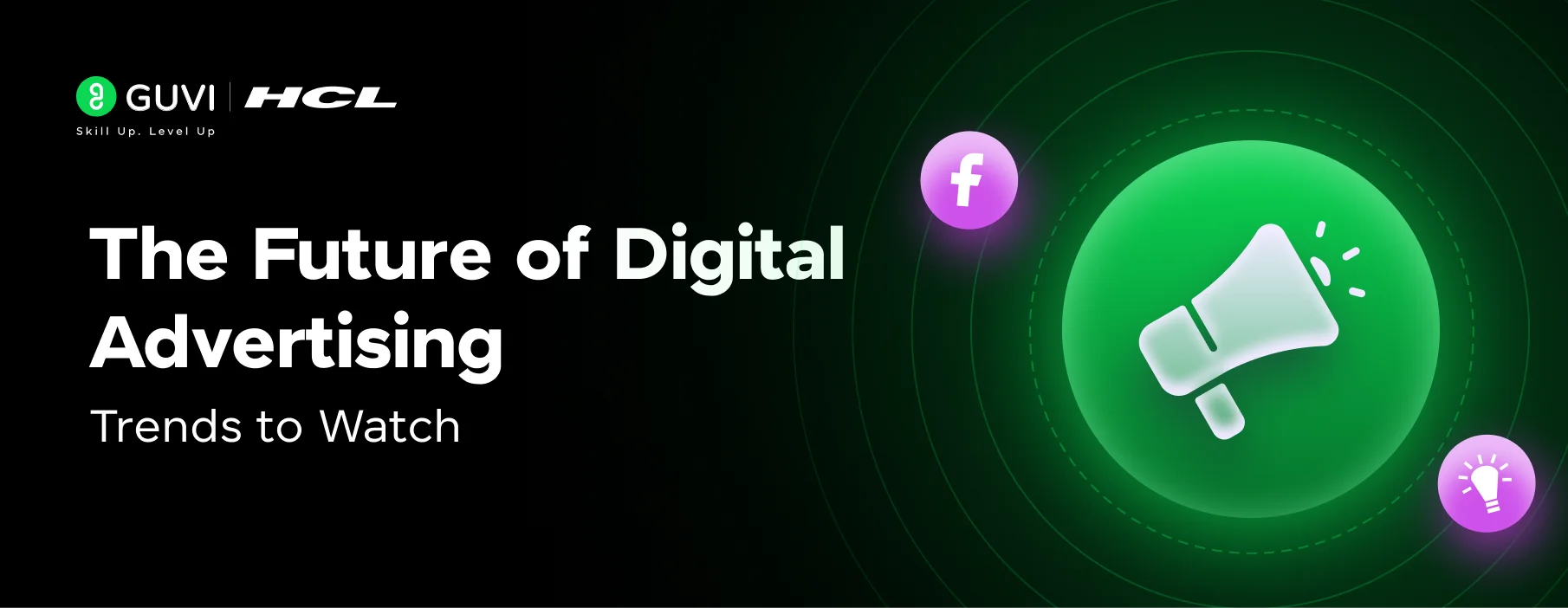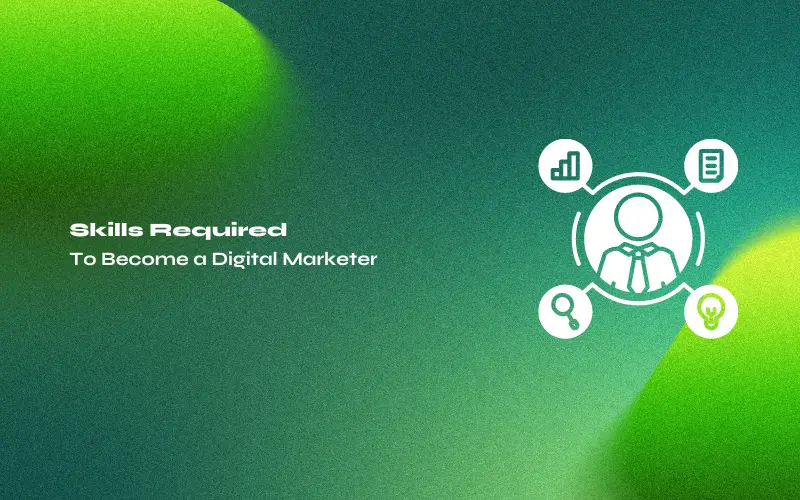
The Future of Digital Advertising: Trends to Watch
Mar 13, 2025 5 Min Read 2920 Views
(Last Updated)
In the fast-evolving landscape of digital marketing, staying ahead of the curve is not just a competitive advantage; it’s a necessity. From the rise of AI-powered tools to the growing emphasis on privacy, the future of digital advertising promises to be both challenging and exhilarating.
This blog explores the most compelling trends and predictions shaping the future of digital advertising, providing insights that marketers need to thrive in this dynamic environment.
Let’s take a fun ride through the future of digital advertising. But first, let’s see how we got here.
Table of contents
- How Marketing Has Changed?
- Power of Digital Platforms
- Trends Shaping the Future of Digital Advertising
- The Role of Privacy Regulations
- The Influence of Artificial Intelligence
- How Consumer Behavior is Changing?
- Game-changing tech in Advertising
- E-Commerce Acceleration
- Wrapping Up
- FAQs
- What are the advantages of digital advertising?
- Is sustainability important in digital advertising?
- How does social commerce impact digital advertising?
How Marketing Has Changed?
Digital marketing has turned the tables, giving everyone from your local coffee shop to global giants a chance to shine. Unlike the old days when big budgets ruled, now even small businesses can make a big splash.
The marketing game now demands quick thinking and flexibility. Algorithms change, new platforms pop up, and user habits shift. To stay on top, you need to be on your toes.
Before we move to the next part, Gain a deeper knowledge of business analytics and digital marketing concepts. You can consider enrolling yourself in GUVI’s Business Analytics and Digital Marketing Course, which lets you gain practical experience by developing real-world projects and covering technologies including Power BI, Excel, SQL, Tableau, Data Visualization, etc.
Additionally, if you would like to explore Marketing Research Techniques through a Self-paced course, try GUVI’s Marketing Research Techniques certification course.
Power of Digital Platforms
Digital platforms have flipped marketing on its head. They let you target your audience with pinpoint accuracy, a far cry from the old “spray and pray” approach.
Social media has changed the game, creating communities and connecting businesses with customers worldwide in a snap.
Platforms like Facebook, Instagram, and X are huge influencers in how people shop and what they like. They’ve reshaped social media advertising trends and opened new doors for businesses. The future of digital ads is tied to these platforms. Knowing their power is key to smart marketing.
Find Out Top 10 Social Media Trends
Trends Shaping the Future of Digital Advertising
From AI and Data privacy to customer behavior and evolving technologies, the future has a lot of trends in store for the digital advertising world. Let’s dive in & explore:
1. The Role of Privacy Regulations
In the ever-changing world of digital advertising, privacy regulations have become a game-changer. These laws have reshaped how businesses handle consumer data, affecting many aspects of digital marketing.
Data Protection Measures
With privacy regulations on the rise, marketers must adopt solid data protection measures. Transparent data handling is key to safeguarding consumer data and building trust, highlighting the importance of data security and accountability.

Privacy-focused technologies and tools have sprung up, allowing users to protect their online privacy and limit data tracking. This could mean fewer targeting and tracking capabilities for digital advertising strategies.
Despite the hurdles, these privacy regulations offer marketers a chance to stand out. By putting consumer privacy first and using ethical data practices, marketers can build stronger relationships with customers and show they respect privacy rights.
As digital advertising keeps evolving, privacy regulations will only get more important. Staying updated with these laws is crucial for marketers to succeed in the future of digital advertising while respecting consumer privacy.
Also Read: Data-Driven Marketing: Benefits and Challenges
2. The Influence of Artificial Intelligence
Artificial Intelligence, or AI, isn’t just a tech buzzword anymore. It’s a game-changer across industries. Its impact on digital advertising is huge and promises exciting growth.
AI in Advertising Growth
The global AI market is set to explode, projected to grow twentyfold by 2030, hitting nearly two trillion U.S. dollars. This massive growth shows how AI is reshaping our world, especially in digital advertising.
AI is revolutionizing advertising with smart targeting, personalization, and automation. As everything goes digital, AI in advertising is expected to skyrocket, changing digital advertising trends and beyond.
McKinsey says half of the companies are already using AI, especially in service operations, product development, and marketing. This widespread use highlights AI’s potential to transform industries, including digital advertising.
AI Advantages in Marketing
When it comes to marketing, 26% of people surveyed and 45% of AI adopters agree that AI gives them a big edge over competitors in advertising.
AI helps advertisers build stronger connections, outshine competitors, boost engagement, and achieve impressive ROI in digital advertising. Vendors are adding AI features to ad tech, making it easier for ad agencies and everyday users to tap into powerful tools for social media advertising trends and programmatic advertising trends.
AI in digital advertising isn’t just a passing fad; it’s a major shift. As AI keeps evolving, it’s set to further revolutionize digital advertising. From predictive analytics to personalized ad targeting, the possibilities are endless. If you’re into digital marketing, now’s the right time to explore AI in digital advertising and see what it can do.
Read More: AI Video Revolution: How the Internet is Forever Changed
3. How Consumer Behavior is Changing?
Getting a grip on how people shop and make decisions is key to staying ahead in digital advertising. With everyone glued to their screens and craving that personal touch, the game is changing fast.
Everyone’s Online
People are more plugged in than ever. They’re using their phones and computers to check out products, compare prices, and hit that “buy now” button. This shift means shoppers have more power than ever before, flipping the script on brands.
But it’s not just about shopping. Folks are hopping on social media to share their thoughts and connect with brands. This gives them a megaphone to voice their likes and dislikes and brands a direct line to their audience.
Convenience is king. People are willing to shell out extra cash for services that save them time, like online shopping and same-day delivery. To keep up, businesses need to jump on the digital bandwagon.
Making It Personal
With everyone online, people want experiences that feel made just for them. They want brands to get them and offer products that hit the mark. This has led to a boom in personalized marketing, like targeted ads and recommendations.
Personalization isn’t just about slapping a name on an email. It’s about using data to send the right message to the right person at the right time.
As the digital world keeps spinning, consumer habits will keep shifting. Businesses that get these changes and tweak their strategies will be the ones that thrive in the future of digital advertising.
Explore: Top 10 Strategies to Optimize PPC Ads & Boost Sales
4. Game-changing tech in Advertising
We’re living in a time when tech is flipping the script on advertising. From blockchain’s promise of honesty to the rocket speed of 5G, these advancements are shaking things up in a big way.
Blockchain: The Truth Teller
Blockchain isn’t just for Bitcoin anymore. It’s stepping into the advertising scene, making everything more transparent and secure. Think of it as a digital ledger that everyone can see but no one can mess with.

This means you can track every ad delivery, cut down on fraud, and know exactly where your money’s going. It’s like having a superpower for your ad budget.
Imagine running an ad campaign and knowing every penny is well spent. No more guessing games. Blockchain makes it happen.
5G: The Speed Demon
Then there’s 5G. This isn’t just faster internet; it’s a whole new ball game.
For advertisers, this means you can push out high-quality, interactive content without a hitch. Think augmented reality ads that don’t lag or virtual reality experiences that feel real. Plus, with better data collection, your ads hit the right people at the right time.
The Future is Now
Blockchain and 5G are not just buzzwords; they’re the future of advertising. They offer new ways to connect, engage, and get your message across. As these technologies evolve, they’ll keep changing how we think about ads and how we reach our audience.
Also Read: 8 Best YouTube Channels to Learn Digital Marketing
5. E-Commerce Acceleration
E-commerce is booming, and it’s not slowing down anytime soon. The pandemic gave it a turbo boost, changing how we shop and interact with brands. Let’s break down what it means for the future of online ads.
Consumer Decision-Making Changes
Shopping isn’t a straight line anymore. It’s more like a loop. People bounce between stages like awareness, consideration, buying, and even rethinking their choices. They get influenced by both online and offline stuff.
Digital platforms make shopping super convenient. Think online shopping, same-day delivery, and other perks that make life easier. This convenience is why more people are shopping online.
Modern marketing can jump in at any stage of a shopper’s journey. Social media retargeting, for example, can nudge people to buy something they looked at but didn’t purchase. It’s all about personalized communication.
Also, Explore the Top 15 Growth Marketing Strategies
Wrapping Up
The future of digital advertising is a thrilling blend of innovation, technology, and evolving consumer expectations. As the landscape continues to shift, marketers must embrace these trends and predictions to remain relevant and effective.
By leveraging the power of AI, prioritizing privacy, and exploring new formats and platforms, brands can create impactful and ethical advertising strategies that resonate with today’s savvy consumers. Staying ahead in digital advertising requires not just adapting to change but anticipating it, ensuring that every campaign is as dynamic and forward-thinking as the audience it aims to engage.
Kickstart your career by enrolling in GUVI’s Business Analytics and Digital Marketing Course where you will master technologies including Power BI, Excel, SQL, Tableau, and Data Visualization, and build interesting real-life business-analytics projects.
Alternatively, if you want to explore Marketing Research Techniques through a Self-paced course, try GUVI’s Marketing Research Techniques certification course.
FAQs
The advantages of digital advertising include targeted reach, cost-effectiveness, measurable results, flexibility, global reach, engagement, personalization, higher conversion rates, and more.
Yes. Sustainability is important because consumers increasingly prefer brands that demonstrate ethical and socially responsible practices. By highlighting commitments to environmental and social causes, brands can build trust and loyalty among conscientious consumers.
Social commerce is the integration of e-commerce within social media platforms, allowing users to discover and purchase products directly. It’s changing digital advertising by creating seamless shopping experiences and leveraging social networks to boost sales.




















![How to Switch from Sales to Digital Marketing: A Beginner's Guide [2025] 4 sales to digital marketing](https://www.guvi.in/blog/wp-content/uploads/2025/01/How-to-switch-your-career-from-Sales-to-Digital-Marketing.png)









Did you enjoy this article?